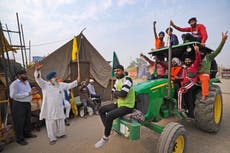Indian farmers hold mass rally to keep pressure on Modi government
Last week PM Narendra Modi announced the repeal of three contentious farm laws that have sparked a year of protests in India


Buoyed by their victory in getting Narendra Modi to repeal a set of contentious agricultural reforms, Indian farmers held a mass rally on Monday in order to keep up the pressure on the government.
Described as a show of strength to ensure the government keeps to its promise, thousands of farmers attended the rally in Lucknow in the northern state of Uttar Pradesh.
Farmer leaders addressed the crowd and said that the promised repeal of the farm laws, which Mr Modi has said will be delivered in the next parliamentary session, is only the first victory for their year-long protest, and that the government is giving “too little even now, even though there were several demands on the table”.
Samyukt Kisan Morcha, the umbrella body of farmer unions coordinating the protests, said in a statement that a letter had been sent to Mr Modi raising the farmers’ pending demands.
These include a legal guarantee that farmers will continue to receive a minimum support price (MSP) — a fixed minimum rate backed by the government — for all agricultural produce. Presently the government only provides support prices for rice and wheat.
The farmers also demanded the withdrawal of a bill to reduce state control of electricity provision (currently farmers don’t have to pay for their electricity in India); protections for farmers who burn crop stubble from being penalised under Delhi air quality regulations, and the withdrawal of hundreds of criminal cases brought against farmers who have taken part in the ongoing agitation.
They also demanded the dismissal and arrest of the cabinet minister Ajay Mishra Teni, whose son is accused of driving one of the cars in a cavalcade that mowed down eight people at a farmers’ protest last month in Lakhimpur Kheri.
In their letter the farmers have also demanded compensation and rehabilitation support to the families of farmers who have died during the protests, and a memorial in their name at Delhi’s Singhu border, one of the main protest sites. Over 600 farmers have died in the ongoing agitation against the three laws.
The contested farm laws were first passed by the Modi administration in September 2020. Despite representing the biggest reforms to agriculture in India for decades, the bills raced through parliament with only a brief debate and no committee scrutiny.
The laws are designed to open up farming to the private sector, and the government described them as a necessary step to modernise a heavily subsidised system that is no longer fit for purpose.
Farmers, however, feared the measures would leave them open to exploitation by big corporations that are close to the current government, and that it would be a step on the road to doing away with their MSP.
On Friday, in a rare U-turn, Mr Modi announced that the three laws will be repealed and asked the farmers to go back to their homes.
In their statement, the farmers’ body said: “We want to assure you (Mr Modi) that we are not fond of sitting on the streets. We too desire that after resolving these other issues as soon as possible, we return to our homes, families and farming. If you want the same, then the government should immediately resume talks with the Samyukt Kisan Morcha on the above six issues.”
The protest launched last year had emerged as one of the biggest challenges to Mr Modi’s government. The government had been criticised by the opposition parties for bulldozing the laws through parliament without consulting stakeholders or any state administrations. The government later offered to suspend the laws and hold consultations, but by this point farmers demanded nothing short of a complete repeal.
Join our commenting forum
Join thought-provoking conversations, follow other Independent readers and see their replies
Comments


Bookmark popover
Removed from bookmarks